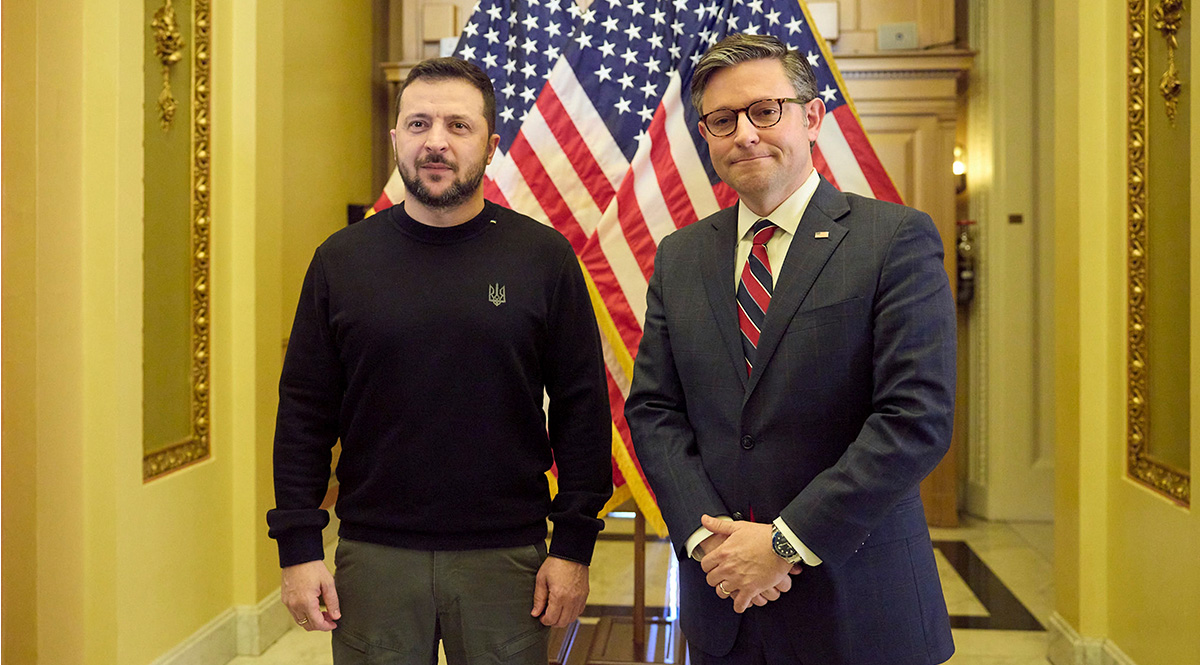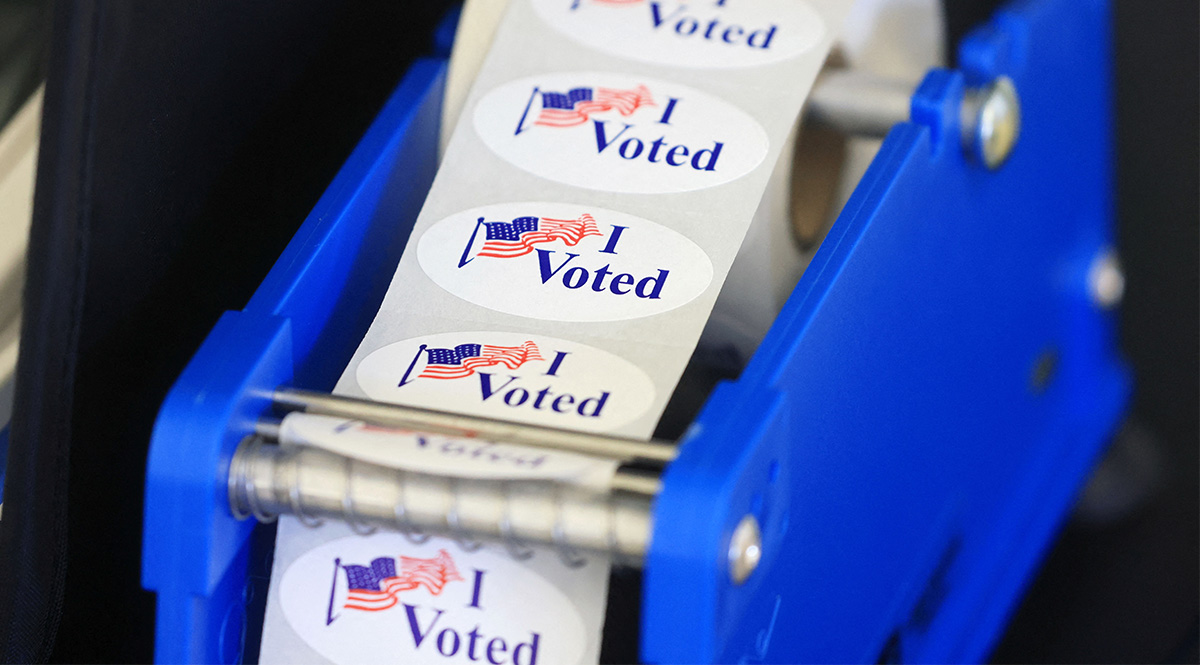Neo-Isolationism Influencing the U.S. Presidential Campaign
Arguments around transforming American foreign policy in the spirit of neo-isolationism appear in messages by the Republican Party (GOP) in the U.S. electoral debate. These beliefs are mostly shared by Donald Trump, who is running for election again as president, and are reinforced by conservative expert institutions in the U.S. Regardless of the outcome of the upcoming presidential elections, the role of neo-isolationist demands in the body politic are likely to increase, which will directly affect future defence policies and strategies, along with U.S. involvement, in Europe and other regions.
 Brian Snyder / Reuters / Forum
Brian Snyder / Reuters / Forum
One of the main themes constantly present in American politics is a form of isolationism that emphasises defending state interests and security, and the minimisation of benefits of international cooperation, as reflected in the “America First” slogan. Historically, this trend called for a policy of remaining outside of military alliances. Extreme positions even included completely avoiding deeper economic contacts so as not to create interdependence with foreign partners. However, the moderate form of this isolationism was characterised as distancing the country from political involvement abroad, while striving to maintain a significant role for the United States in economic relations. The key in this regard has been to apply protectionist trade policies (e.g., tariffs on goods imported from partners) or negotiate trade agreements in a way that maximises the benefits for the U.S. Isolationism is, however, in direct contrast to the U.S. policy of playing a leading role in maintaining the liberal international order based on a system of alliances and cooperation in multilateral forums, pursued by both Republican and Democratic administrations since the mid-20th century.
The Role of Neo-Isolationism in the Presidential Campaign
In the American public discourse, isolationist slogans have been gaining popularity at a level not seen since the 1930s and 1940s. They are an element of the internal American discussion on the importance of foreign policy. Trump supporters, mainly those associated with the “Make America Great Again” (MAGA) movement are also turning to neo-isolationism. For example, they are critical of the federal government’s approach to immigration, seeing it as ineffective. In foreign affairs, they advocate selective and conditional U.S. involvement in the world, which distinguishes them from other Republicans who support the policy of assertiveness in the international arena. Neo-isolationists believe that a strategic reorientation of U.S. foreign policy away from Europe and toward opposing China, especially in the Indo-Pacific region, is necessary. This position is partly consistent with the views of moderate GOP politicians and experts who do not share neo-isolationist views, but it prioritises increasing the U.S. role in Asia (so-called “Asia First”).
American Neo-Isolationism in Practice
Demands for limiting U.S. global involvement are put forward by Trump, the presumptive GOP candidate in the upcoming presidential elections. The main promoters influencing neo-isolationism on U.S. foreign and defence policy are an extreme group of Republicans supporting Trump, including Senators J.D. Vance (Ohio) and Josh Hawley (Missouri) and Representatives Marjorie Taylor-Greene (Georgia) and Matt Gaetz (Florida). For Trump supporters, it is crucial for the United States to limit migrants crossing the southern border with Mexico and reform the immigration system by, for example, increasing the competences of local courts and uniformed services to deport irregular migrants on an expedited basis. According to the latest polls, 57% of Republican voters and as many as 92% of Trump backers say that the federal government pays too little attention to immigration. They also believe that Biden is devoting excessive attention to the Russia-Ukraine war. Among the neo-isolationists in the GOP, opposition to further military and financial support for Ukraine is growing.
They also criticize U.S. participation in defence alliances, including with Japan and South Korea and in NATO. They argue that the U.S. bears disproportionately high costs of defending its allies and want the administration to pressure foreign partners to increase defence spending. They seek to limit the U.S. role in NATO (e.g., by suggesting to reduce the contribution to the Alliance’s budget) or even withdraw from it completely. However, these extreme voices are contrary to the opinions of the majority of Republican voters. Surveys from February 2024 indicated that 61% of Trump voters have a positive attitude towards U.S. involvement in NATO. However, about 40% would not support the participation of U.S. troops in defending Alliance members in the event of Russian aggression, such as the Baltic States.
Neo-Isolationism’s Expert Network
This view of foreign policy is supported by some analytical institutions in the U.S., such as the Heritage Foundation and the American First Policy Institute, as well as non-governmental organisations like the Conservative Partnership Institute, led by former Trump administration officials. They are creating comprehensive policy projects, counting on top positions in the new administration after Trump’s victory in the November elections. They aim to implement far-reaching reforms to the federal government. In their opinion, individual departments (including State, Defence, Education, Labour) and federal agencies (like the FBI) are under the influence of officials with too liberal views who may sabotage the next Trump administration. They are to be replaced with staff that share the principles of Trump’s political conservatism.
These conservative experts believe that the global competition with China should be considered the priority in defining the scope of foreign and security policy for a future administration. They signal that the U.S. should expect greater involvement of allied countries in combating China’s growing global influence. While they admit that the war in Ukraine is an issue that divides GOP politicians, they believe that a future Republican administration should strive to quickly resolve the conflict in order to focus primarily on the competition with China. This would mean freezing the war, leaving eastern Ukraine under Russian occupation. For them, NATO is there to deter Russia, but the main role of conventional defence is to be handled by European allies, which the U.S. would support with its nuclear potential. The key in this regard is to put more effective pressure on U.S. allies in order to relieve the American forces in, among others, combating regional threats from Iran, North Korea, and Russia. At the same time, these experts associated with Trump envision a reduction in the presence of U.S. armed forces in Europe. Regarding future relations with Europe, neo-isolationists condition U.S. involvement on European countries increasing their military spending to at least 2% of GDP. They also suggest revising bilateral trade agreements to enhance the benefits for the U.S. and strengthening relations with Central and East European (CEE) countries. They consider this crucial for future U.S. cooperation with the EU and for deterring Russian aggression in Europe.
Conclusions and Perspectives
Limiting political involvement in international affairs in favour of solving domestic problems is a growing demand of some Republican voters.
Neo-isolationist positions are consistent with Trump’s statements. The growing influence of his supporters in the GOP who repeat the neo-isolationist narrative has already affected the legislative process in Congress, for example, the blocking of further financial assistance to Ukraine and criticism of some NATO allies. Work conducted by conservative experts is shaping and promoting opinions that have become popular among Trump’s electorate and with the former president himself. This increases their influence on his election campaign.
Trump’s possible victory in November and the entry of neo-isolationist supporters into his administration would result in a return to and extension of the policy of trade protectionism and transactionalism towards the defence of allies. This ultimately will limit the effectiveness of American policy and diminish the image of the U.S. as a reliable partner. Trump, in a second term, may, for example, limit the financial contribution to the NATO common budget, which will negatively impact Alliance activities. In matters of foreign and defence policy, the priority would be competition with China, which would reduce American interest in Europe. Such a move would be met with criticism from Poland and other CEE partners, for whom U.S. involvement in deterring Russia in Europe is crucial. Nonetheless, for Poland, its high expenditures on defence may have a positive impact on its perception by a future Trump administration. However, possible U.S. attempts to tighten relations with CEE states at the expense of U.S.-EU relations may generate internal divisions in Europe, reducing European cohesion, for example in the response to Russia’s aggression against Ukraine.





